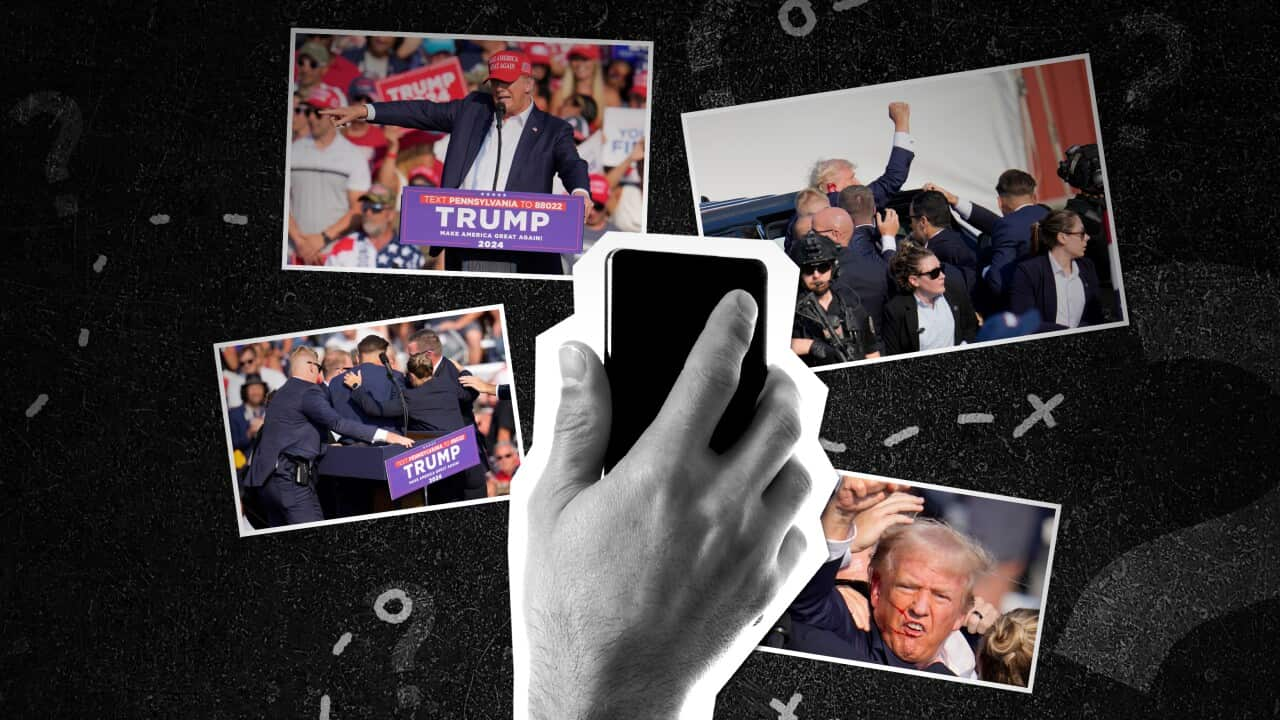Within minutes of the , unsubstantiated claims about the incident started to flood social media.
Theories ranged from the Secret Service overlooking security gaps to the attack being ordered by President Joe Biden.
Some pointed to comments made by Biden the previous week about putting "Trump in a bullseye", which Biden says referred to their election battle.
Meanwhile, some pointed the finger at Trump, suggesting the Republican candidate had orchestrated the incident to boost his campaign — or worse, to further antagonise his supporters and start a civil war.
While theories like this can help stop people feeling powerless, they're not particularly effective in the long run, experts say.
What is a conspiracy theory?
A conspiracy theory is the belief that a significant event has been "plotted or hatched in secret by some malevolent actors" or a powerful group, Mathew Marques told SBS News.
The senior lecturer in psychology at La Trobe University says an event has to be significantly "large-scale" for conspiracy theories to take off.
He pointed to the 1963 assassination of then-president John F Kennedy as a prime example, with 65 per cent of Americans believing that multiple people were involved in plotting the attack.
Why people turn to conspiracy theories during big events
Ullrich Ecker, professor of cognitive psychology at the University of Western Australia, said some people feel that "big" events must have "big causes".
"In general, conspiracy theories can help people make sense of events that they find difficult to explain," Ecker told SBS News.
"Uncertainty and a feeling of lack of control create psychological discomfort, so people in such states are more likely to accept explanations that might be objectively implausible."

Well over half of Americans believe that multiple people were involved in plotting the assassination of former president John F Kennedy in 1963.
Marques added that people don't like uncertainty or feeling powerless, so believing that events are being orchestrated by an "out-group" helps people maintain a sense of order in the face of perceived threats.
For instance, some may find it comforting to believe the attempted assassination of Trump was a Democratic Party plot, or that the shooter was somehow linked to the Democrats through donations he made as a teenager.
reportedly made a US$15 ($22) donation to a political action committee that supports left-leaning and Democratic politicians.
"These kinds of explanations tend to make people feel more safe, certain and feel better about themselves and what they've experienced," he said.
Are particular people more drawn to conspiracy theories?
While some people have more of a conspiracy mindset, Marques said such explanations attract all sorts of people.
American political scientist Joseph Ucinski suggests "conspiracy theories are for losers".
"They tend to resonate when groups are suffering from loss, weakness, or disunity," he concluded in his book American Conspiracy Theories.
Referring to this concept, Marques said "people come up with explanations when they lose political events" or "are motivated by defeating a particular group or feeling like you've gained an advantage against an out-group".
He said they can also be used as a way to maintain a positive sense of self or connection to others, with people "often believing the same sorts of conspiracy theories that people around them in their groups share".
"False beliefs shared by others of your in-group can also foster a sense of community and togetherness, which may be particularly so in a time where you feel your in-group is under attack," Ecker said.
Are conspiracy theories comforting?
Marques explains that, while conspiracy theories are initially alluring for that "sense of comfort or certainty", studies suggest people who believe in them "end up feeling worse over time".
He said that, with time, people just "feel more disempowered. They feel disillusioned and (conspiracy theories) may lead them to feel isolated as well."
They may also reinforce emotions such as anxiety or a sense of existential threat.
"So, on one hand, they seem appealing, like they provide the answers but on the other hand, research suggests that they kind of don't provide or satisfy these motivations for people."












